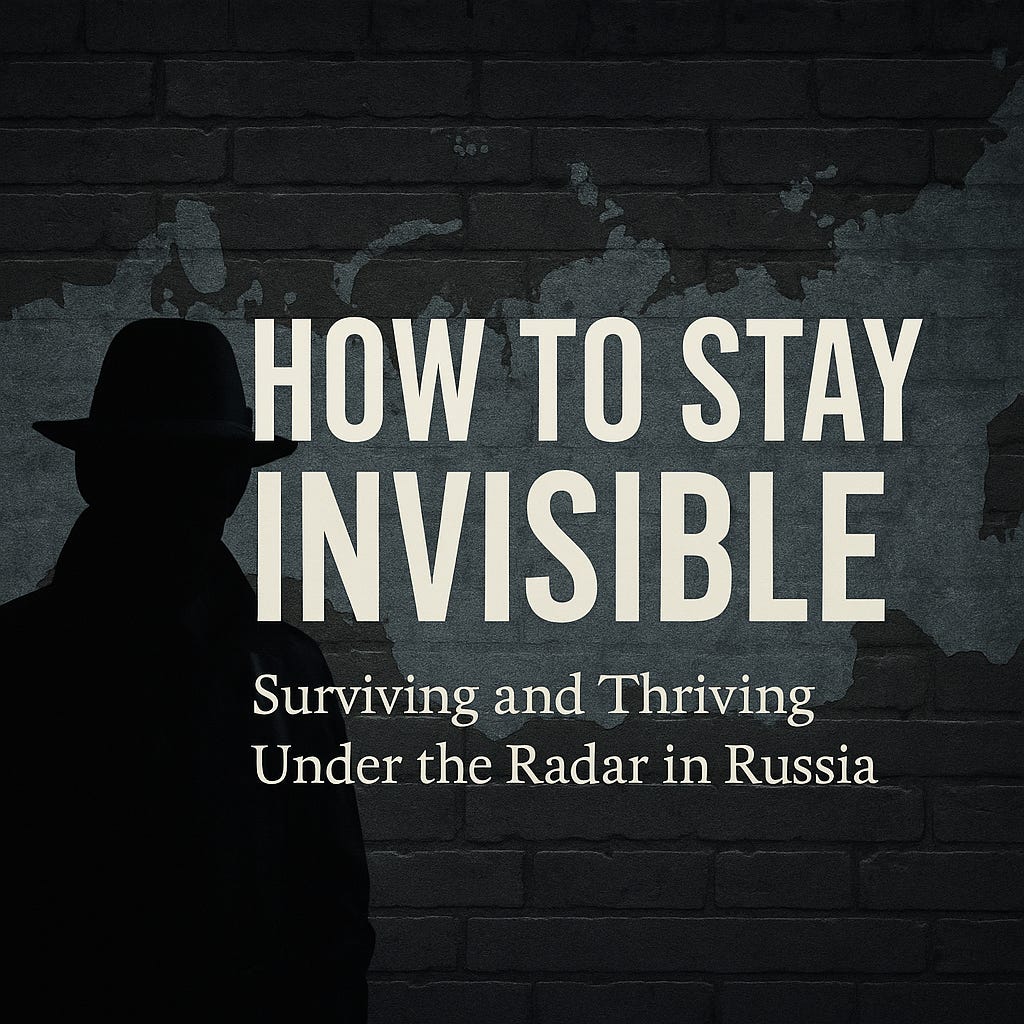How to Stay Invisible: Surviving and Thriving Under the Radar in Russia
Not about fear—about freedom. A firsthand guide to blending in, staying safe, and navigating Russia’s legal and cultural landscape without becoming a target.
🇺🇸 American Inside Russia
Exploring Life Beyond the Narrative
🗓️ June 2, 2025
“Not pro-Russian. Not anti-Western. Just pro-reality.”
When people ask me how I’ve managed to live so long inside Russia without significant difficulties, fines, or random interrogations, I usually answer with one word: invisibility. Not the cloaked-in-black, hiding-in-alleys type. I mean the kind that comes from understanding how systems work, respecting cultural norms, and learning when to be loud—and when to be quiet.
Today’s article isn’t about fear. It’s about freedom. Real freedom doesn’t always come from asserting your presence. Sometimes it comes from not making the wrong impression in the first place.
1. 🧠 Know the Unwritten Rules
Russia has written laws—and then it has the rules everyone actually follows. They’re not always the same.
Registration with migration services is technically required within 7 days of arrival or internal movement,1 but enforcement is inconsistent unless you give officials a reason to look deeper.
Random police checks do happen, but they usually focus on behavior that appears out of place—like speaking loudly in a foreign language on public transport, engaging in visible activism, refusing to present documents, or drawing attention while driving.
High-security zones like Sevastopol, military towns, and border regions near Finland, Ukraine, or Kazakhstan require extra caution.2
📝 Tip: Blend in physically and socially. In cities lie Moscow, dress conservatively and avoid anything that screams “tourist.” That includes flashy logos, backpacks worn on both shoulders, or wearing tennis shoes in public when you’re not exercising—yes, even that can stand out. Russians tend to dress more formally in daily life, and blending in can mean the difference between a quiet metro ride and a police ID check. In Crimea (or anywhere in Russia), never photograph anything that even might be military—especially naval facilities and air defense systems. And in regions like Chechnya or Dagestan, respecting local customs— particularly regarding dress codes and behavior toward women—is vital.
2. 🗂️ Master the Paper Game
Bureaucracy in Russia isn’t optional—it’s foundational. The way you present documents often matters more than what’s written on them.
By Russian law, all foreign citizens must carry the original passport, migration card, and registration slip at all times. In reality, though, many experienced expats and travelers take a more practical approach—especially in major cities.
Day-to-day: Carry high-quality copies of your passport’s photo page, visa, migration card, and registration slip. Most officers will accept them during routine checks, as long as you’re cooperative, respectful, and confident.
When to carry originals: Always bring your original documents when:
Traveling between regions or cities
Visiting government buildings or police stations
Staying near borders, military zones, or airports
When facing an issue, reference exact federal laws or administrative codes—Article 18.8 of the Code of Administrative Offenses (КоАП) is frequently cited in foreigner cases.3
📱 Digital tip: Keep backups of your documents stored securely on your phone and in the cloud. A well-organized file can de-escalate any check before it starts.
🎯 Pro Tip: If questioned, don’t get emotional. Calmly say your originals are secured at home and that you can produce them if needed. The goal isn’t to argue—it’s to show that you’re respectful, aware, and prepared. Be so professionally prepared that escalation becomes unnecessary.
🤫 Use Silence Strategically
In Russia, silence isn’t just golden—it’s respected. The cultural adage “Тише едешь — дальше будешь” (“The quieter you go, the farther you get”) exists for a reason. In a society where indirectness and caution often trump confrontation, restraint is seen as wisdom.
There’s another saying: “Молчи — за умного сойдёшь.”
(“Stay quiet, and you’ll pass for smart.”)
This isn’t paranoia—it’s prudence. In a place where laws are interpreted broadly and social cues matter deeply, not saying something is often safer than saying the wrong thing.



